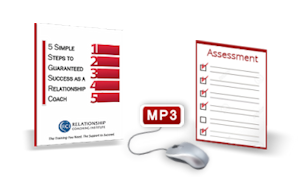 Here at RCI’s relationship coach training programs we encourage a “learn by doing” approach to training by practicing your coaching skills with real people; first with “people to practice with” (usually just one ad hoc conversation with friends/family), “practice clients” (usually at no charge), and eventually paying clients.
Here at RCI’s relationship coach training programs we encourage a “learn by doing” approach to training by practicing your coaching skills with real people; first with “people to practice with” (usually just one ad hoc conversation with friends/family), “practice clients” (usually at no charge), and eventually paying clients.
Helping people with their life is a big responsibility that can have serious consequences and when you’re just starting out you most likely have little to no experience or qualifications, so we recommend the following:
1. Be honest with yourself and others.
When you are in training to become a coach, be honest that you are still learning, that you are not qualified to address serious life situations, and that a coach helps people accomplish goals, not solve problems.
2. Start small and easy.
In RCI relationship coach trainings we encourage you to choose easy topics for coaching because you will learn your coaching skills faster and more effectively by starting with straightforward, “easy” coaching clients and situations, which applies to getting your first practice clients as well. This is your agenda as a new coach.
However, your clients will have their own agenda and will understandably want help with their biggest problem or challenge. While, as a coach, we always want to honor and address our client’s agenda, if you’re not comfortable and don’t feel qualified to help someone with the topic/situation of their choosing, DON’T. Remind them that you are still in training or just starting out and ask them if there is something smaller they would like to work on to start.
3. Coach goals, not problems.
What motivates people to talk to you and get your help is often a big, huge problem they’re experiencing, such as whether to stay in a relationship, dealing with mental health issues such as depression, health challenges, financial difficulties, legal problems, etc.
Even if you’re comfortable doing so, directly addressing a problem is NOT coaching, so keep the Big Picture in mind and use your Coaching Superpower to help them re-frame their problem into a goal, help them develop their Vision for the life they want, and identify the other goals needed to achieve that Vision, before focusing on the goal that would address their pressing problem. You are a COACH, your role is NOT to be a counselor, therapist, consultant, or other problem-solving helping professional.
4. Identify and enforce professional boundaries.
A Professional Coach is clear about who they can help and who they can’t. We only accept clients who are a good fit, and refer to other helping professionals when they aren’t a good fit for our services. This goes DOUBLE for you while you’re in relationship coach training or recently graduated.
As a Relationship Coach you would only work with clients who have relationship goals. This gets murky for life coach trainees and new coaches who tend to be open to coaching about anything but when coaching your first clients you have very limited experience. See a problem with that?
We strongly recommend that you identify who you are able to help and decline to engage someone whose situation is not a fit for your skills or qualifications. Either ask them if they have something smaller to address that is within your skill level or refer them to the appropriate type of helping professional. The relationship and conversation needs to work for both parties- your client deserves to get effective support and you need to practice and develop your new coaching skills, not get thrown into the deep end and risk a lawsuit.
5. Focus on functioning and self care.
As a Professional Coach as well as a coach in training, when your client, practice client, or someone you happen to have a conversation with is experiencing a big, stressful problem, first focus your Coaching Superpower on their ability to function and address their basic needs. They will not be able to effectively solve their problem if they are so stressed out that they are not sleeping, not eating, not going to work, struggling to care for their kids, and not getting the emotional support they need as well as the appropriate professional support they need.
Your best role in helping someone in anything, especially when dealing with a big, stressful problem, is NOT to help them solve the problem (see #3 above), it is (as with all coaching) to help them move forward effectively towards the future they desire. Please remember- “Functioning First.”
6. Get the support you need.
Here at RCI we have a team of mentors committed to supporting your success. Use them! If you’re reading this and not a member of RCI, reach out to your former coach trainers and mentors. If you don’t have a robust support system for the business and practice of becoming a successful coach, consider joining RCI even if you’ve graduated another coach training program.

